
The Jakarta Post is a daily English-language newspaper in Indonesia. The paper is owned by PT Bina Media Tenggara and based in the nation's capital, Jakarta.
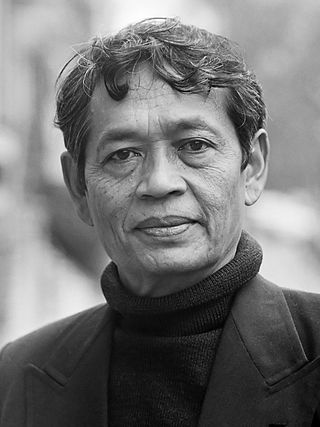
Mochtar Lubis was an Indonesian Batak journalist and novelist who co-founded Indonesia Raya and monthly literary magazine "Horison". His novel Senja di Jakarta was the first Indonesian novel to be translated into English. He was a critic of Sukarno and was imprisoned by him.

The Labour Party was a political party in Indonesia. It was formed on 25 December 1949 by a group of former Labour Party of Indonesia (PBI) members, who had disagreed with the merger of PBI into the Communist Party of Indonesia.
Party of the People of Free Indonesia was a political party in Indonesia. The party was based amongst the Sundanese population in West Java. In the 1955 parliamentary election, PRIM got 72,523 votes. One parliamentarian was elected from the party. After the election the party joined the Fraction of Upholders of the Proclamation, a heterogenous parliamentary group with ten MPs.
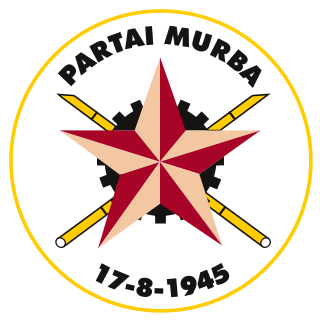
Murba Party was a 'national communist' political party in Indonesia. The party was founded by Tan Malaka, Chairul Saleh, Sukarni and Adam Malik in 1948. The history of the party was largely intertwined with that of the powerful Communist Party of Indonesia (PKI). Initially relations between PKI and the Murba Party were fluid, but gradually the two parties developed into each other's arch-enemies. The Murba Party continued to exist under the New Order, but was merged into the Indonesian Democratic Party in 1973.
Suara Karya was a daily newspaper published in Indonesia. Established in 1971 to assist Golkar in winning that year's legislative election, it became required reading for all civil servants and the voice of Golkar. After its circulation increased from 55,700 in 1971 to 300,000 in 1998, the fall of Suharto's dictatorship caused circulation to plummet to 3,000. As of 2005, it was attempting rebranding to present cleaner, less biased news. It ceased print publication in 2016, although is still available online.
Indonesia Raya was an Indonesian newspaper co-founded in 1949 by Mochtar Lubis. Before its permanent closure in 1974, it was banned numerous times during the Sukarno and Suharto governmental period.
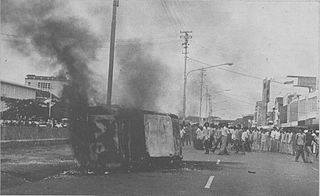
The Malari incident was a student demonstration and riot that happened from 15 to 16 January 1974. In reaction to a state visit by the Japanese Prime Minister, Kakuei Tanaka, students held a demonstration protesting corruption, high prices, and inequality in foreign investments. After provocation by suspected agent provocateurs, the demonstrations became riots, which eventually turned into a pogrom. By the end of the incident, eleven protesters had been killed and hundreds of cars and buildings destroyed.
Suara Pembaruan was an Indonesian daily newspaper. Founded in 1987, it was one of the largest newspapers in Indonesia. Suara Pembaruan brand is owned by BeritaSatu Media Holdings, a subsidiary of Lippo Group, who also owned business daily Investor Daily and television channel BeritaSatu.
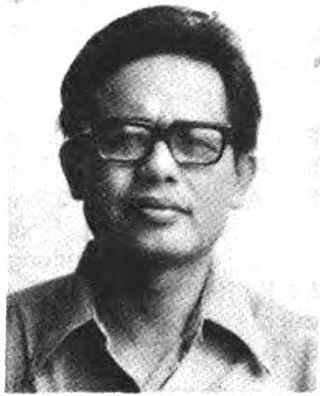
Jakob Oetama was an Indonesian teacher, journalist, and businessman who was one of the co-founders and owners of Kompas Gramedia Group, the largest media group in Indonesia, together with P. K. Ojong. He has served as President Director of Kompas Gramedia, Advisor to the Central Board of the Indonesian Journalists Association, and Advisor to the Association of Southeast Asian Nations Journalists Confederation. He was the recipient of the Honoris causa Doctorate in Communications from Gadjah Mada University and the Mahaputra Utama Star award from President Suharto in 1973.
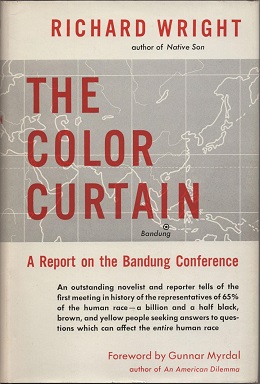
African-American author Richard Wright's book The Color Curtain: A Report on the Bandung Conference is based on his impressions and analysis of the postcolonial Asian-African Conference, which was a gathering of representatives from 29 independent Asian and African countries, held in the city of Bandung, Indonesia, April 18–24, 1955. In addition to drawing on its author's experience as a reporter at the conference, The Color Curtain bases its analysis of the postcolonial world on Wright's interactions with several modern Indonesian writers and intellectuals. Since its publication in 1956, Wright's Indonesian travelogue has been a prominent first-hand account of the Bandung Conference.
Censorship in Indonesia has varied since the country declared its independence in 1945. For most of its history the government of Indonesia has not fully allowed free speech and has censored controversial, critical, or minority viewpoints, and during periods of crackdown it imprisoned writers and political activists. However, partly due to the weakness of the state and cultural factors, it has never been a country with full censorship where no critical voices were able to be printed or voiced.

Pemandangan was a daily Indonesian language newspaper published in the Dutch East Indies between 1933 and 1958. It was one of the few local newspapers which was initially allowed to operate during the Japanese occupation of the Dutch East Indies.

Kwee Thiam Tjing Sia, also known by his pen name Tjamboek Bērdoeri ['Thorn Whip'], was a prominent Indonesian writer, journalist and left-wing political activist. He is best remembered for his 1947 book, 'Indonesia dalem Api dan Bara', and for his role as a co-founder of the Partai Tionghoa Indonesia [the 'Chinese-Indonesian Party'] in 1932.
Asa Bafaqih was an Indonesian journalist, diplomat, and politician. He was best known for being editor-in-chief of the Antara news agency and the Pemandangan newspaper. He also served as ambassador of Indonesia to Sri Lanka and Algeria.

Burhanuddin Mohammad Diah, born only as Burhanuddin, was an Indonesian journalist, diplomat, and businessman, who served as the 18th Indonesian Minister of Information from 1966 until 1968, under the presidencies of Sukarno and Suharto, during the transition to the New Order. He was present at the time of the Proclamation of Independence was being formulated, and was a figure who played an important role in saving the original text of the Proclamation.

Abadi was a daily Indonesian language newspaper based in Jakarta, which was published between 1951–1960 and 1968–1974. The newspaper was affiliated with the Masyumi political party, and was one of the largest newspapers in the Sukarno period until its ban in 1960. After the fall of Sukarno, it resumed publication in 1968 until its second ban in 1974 following the Malari incident during the Suharto period.
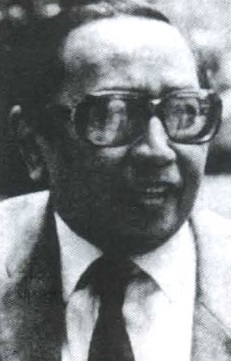
Suardi Tasrif was an Indonesian journalist, writer, and advocate. He became active in journalistic endeavors starting in the Indonesian National Revolution, and led the prominent newspaper Abadi during the Sukarno period since its founding in 1951 until its ban in 1960. He moved into advocacy during the New Order era, lobbying for legal reform in the Suharto regime's early years and becoming a prolific writer on legal and political matters. He has also contributed to the code of ethics of both the journalistic and advocacy professions in Indonesia.
Suluh Indonesia was a daily Indonesian language newspaper based in Jakarta which was published between 1953 and 1965. It was strongly affiliated with the Indonesian National Party. The newspaper was one of the largest in the country during the 1950s and occupied first place in terms of circulation during the early 1960s. It was banned from circulation following the 30 September movement in 1965.












